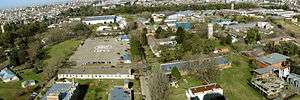National Institute of Industrial Technology
The National Institute of Industrial Technology (Castilian: Instituto Nacional de Tecnología Industrial), commonly known as INTI, is an Argentine federal agency in charge of the development of Industrial technology.



.jpg)


It is a technical reference of the Argentine State in implementing regulations and identity of product quality in industry and commerce, is also responsible for public technology for the integration of the entire community into the production system, promoting partnership and local development and fostering the creation companies and micro enterprises. Plays an important role in relation to industrial competitiveness, particularly strengthening the links national value chains, and implementing innovative solutions, from design stage to final product.
INTI is present in all provinces along Argentina, annually provides services to more than 9000 companies and the state government, through more than 2000 professionals and technicians, spread over 37 research and development centers, seven coordinations, 27 extension units, 16 information offices, programs and special areas.
It was created by Decree-Law nº 17,138 in December 27, 1957. Since the end of 2011 is chaired by a scientific board commission composed of engineers William Fermín Salvatierra (chairman), Ricardo Horacio del Valle (executive vice president) and Dr. José Luis Esperon(vocal).[1][2]
INTI Activities
INTI technological activity covers the spectrum of Argentine production, from food (meat, cereals and oilseeds, fruits and vegetables and dairy products), construction, materials and processes (aerospace, construction, mechanics, surface processes, safety regulations in civil works and textiles), electronics and metrology (electronics and computer science and physics and metrology), chemistry (industrial biotechnology, rubber, organic pollutants, plastics, and chemical surface processes), natural resources and environment (temperature, pulp and paper, leather, energy, packaging, wood and furniture and textiles), quality, extent and development (extension and development, technologies for health and disability, Institute of Industrial and service quality measurement and calibration Argentina). All actions related to innovation and development services, technology transfer, technical assistance, analysis and testing, calibration, certification voluntary and compulsory, ring, audits, extension, training, personnel qualification, and so on.
Basic and applied research
Packaging with bioecological nanocomposite
Among the many activities carried out in the INTI, along with specialists from the UNLP, it is investigating the use of biodegradable materials such as oil industry waste and soy proteins to manufacture eco-friendly packaging. Effective use of nanocomposites, the project aims to reduce pollution at low cost and commitment to technology development towards higher value-added agro-industrial resources.[3]
See also
- INTA, National agricultural technology institute of Argentina
- Science and technology in Argentina
References
- ↑ The second half century of INTI Elements of a Strategic Plan, 2007.
- ↑ History of INTI Official Website.
- ↑ Eco-friendly packaging made from soy protein Argentina investiga, mayo de 2011.
All the resources are under Creative Commons 3.0